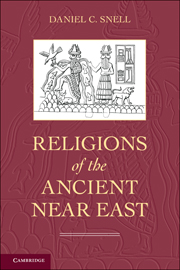Book contents
- Frontmatter
- Contents
- Figures and Maps
- Preface
- Acknowledgments
- 1 Defining Time and Space
- 2 Early Inklings
- 3 Gods, Gods, Gods
- 4 Cities, States, and Gods
- 5 The Lure of Egypt, 4000–1400 BCE
- 6 The Gods of Egypt
- 7 The Akhenaten Dream, 1350–1300 BCE
- 8 Practice in Egypt
- 9 The International Age, 1400–1000 BCE
- 10 Gods and People
- 11 The Lord Is One – Israel in Its Environment
- 12 The Turning
- 13 The Good God and the Bad God
- 14 The Lands of Baal
- 15 Greece, Etruria, Rome, and Conveying Traditions
- 16 The Dead Hand of the Past and the Living God
- 17 Experiencing Ancient Near Eastern Religion
- References
- Index
6 - The Gods of Egypt
Published online by Cambridge University Press: 05 June 2012
- Frontmatter
- Contents
- Figures and Maps
- Preface
- Acknowledgments
- 1 Defining Time and Space
- 2 Early Inklings
- 3 Gods, Gods, Gods
- 4 Cities, States, and Gods
- 5 The Lure of Egypt, 4000–1400 BCE
- 6 The Gods of Egypt
- 7 The Akhenaten Dream, 1350–1300 BCE
- 8 Practice in Egypt
- 9 The International Age, 1400–1000 BCE
- 10 Gods and People
- 11 The Lord Is One – Israel in Its Environment
- 12 The Turning
- 13 The Good God and the Bad God
- 14 The Lands of Baal
- 15 Greece, Etruria, Rome, and Conveying Traditions
- 16 The Dead Hand of the Past and the Living God
- 17 Experiencing Ancient Near Eastern Religion
- References
- Index
Summary
As mortals we are afraid of everything, but we desire everything as though we were immortal.
– de la Rochefoucauld (1613–1680), Maxims, 1959, 100, maxim 511The prince had been out driving in his chariot, alone on the hard desert sands, and in the heat of the day he came back closer to the river, thinking to ask a peasant for a drink. Dismounting, he saw no one; he unyoked his two horses and let them graze on stubble while he walked over into the shadow of the huge old sculpture covered over mostly with sand. Only the head and ears and the head cloth depicted on the head were visible. He lay down and took his siesta, but during his light afternoon sleep, he had a dream.
In the dream, the sculpture came to life, showing the power of the lion that was its lower body and the wisdom of the face that was on its head. “I am all covered up!” the sculpture complained. “No one can see my beauty and my power, and the memory of me has become foggy. People cannot say which king I am exactly, and they call me all kinds of wrong names. But look, you, prince, are alive still and wise. You could have me cleaned up and restored to my former glory. You could proclaim my name so all Egypt would know it – Khafra, meaning ‘the sun-god has actually appeared!’ ”
- Type
- Chapter
- Information
- Religions of the Ancient Near East , pp. 66 - 71Publisher: Cambridge University PressPrint publication year: 2010



